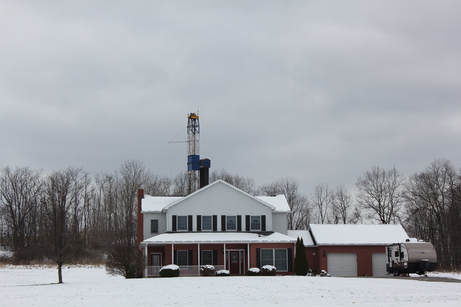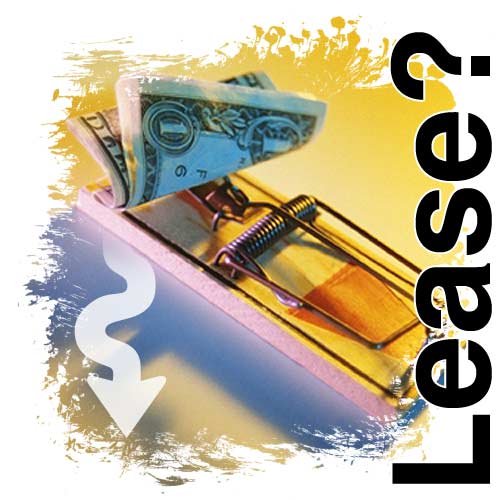How Shale Gas Drilling will DEPRESS Your Property Values
_Imagine this: You lease your
land to a gas drilling company, then before or after drilling, you
decide that you want to sell your land. You find plenty of prospective
buyers—the problem is that none of them can find a bank to finance a
mortgage, because most banks and insurance companies consider gas leased
land to be an unacceptable risk. Where does this leave you? Most
likely stuck. And what does it do to the value of your property? Most
likely depreciate it, and the value of neighboring properties, too.
Or, imagine this: You have not leased your property, but your neighbors have, and— because your property is within 300 feet of theirs—banks also balk at financing your property—because of volatile property values and environmental hazards. |

_Or imagine this: You own a farm or a lake cottage in an area where gas drilling is taking place and the value of your home and land has become so depreciated by the number of unmortgageable properties around you that your investment is no longer worth what you owe on it.
These are not just hypothetical examples. Ask your local bank or credit union. FHA, HUD, GMAC and most major banks and credit unions hold exactly these policies on gas-leased property and the properties near them. Reportedly, Wells Fargo, First Place, Fidelity, First Liberty and Bank of America all consider financing such mortgages excessively risky. HUD, for instance (in its Handbook, 4150.2, page 2.7) puts it this way.
Horizontal Drilling--While gas companies claim that they will only need one drilling pad per square mile, many landowners do not realize that that may include as many as 12 horizontal gas wells emanating from each single pad, or that those horizontal wells extend as far as a mile in all directions to make sure that the entire square mile will be exploited. Each of these square mile coverages is called a “unit.”
Bottom Line--Without a doubt, massive gas drilling will inevitably lead to serious property devaluation and property tax decreases throughout the region.
Time is running out. The gas companies like to say they’re bringing us a windfall, but if you look at where they’ve been, it looks more like a tornado has blown through.
The banks and insurance companies know this perfectly well, and that’s why they often consider gas-leased land too risky to finance. We need to wake up. Fight to protect our values (both property and otherwise) before it’s too late.
Article by Steve Coffman
--------------------------------------------------------------------
Houses for Shale- article written in the Pike County Courier.
--------------------------------------------------------------------
New York State Bar Association Journal- article written by Elisabeth N. Radow.
Excerpt: Residential fracking carries heavy industrial risks, and the ripple effects could be tremendous. Homeowners can be confronted with uninsurable property damage for activities that they cannot control. And now a growing number of banks won’t give new mortgage loans on homes with gas leases because they don’t meet secondary mortgage market guidelines. New construction starts, the bellwether of economic recovery, won’t budge where residential fracking occurs since construction loans depend on risk-free property and a purchaser. This shift of drilling risks from the gas companies to the housing sector, homeowners and taxpayers creates a perfect storm begging for immediate attention.
These are not just hypothetical examples. Ask your local bank or credit union. FHA, HUD, GMAC and most major banks and credit unions hold exactly these policies on gas-leased property and the properties near them. Reportedly, Wells Fargo, First Place, Fidelity, First Liberty and Bank of America all consider financing such mortgages excessively risky. HUD, for instance (in its Handbook, 4150.2, page 2.7) puts it this way.
- Operating and abandoned oil and gas wells pose potential hazards to housing, including potential fire, explosion, spray and other pollution.
- No existing dwelling may be located closer than 300 feet from an active or planned drilling site. Note that this implies to the site boundary, not to the actual well site.
- The appraiser must examine the site for the existence of or any readily observable evidence of a well.
Horizontal Drilling--While gas companies claim that they will only need one drilling pad per square mile, many landowners do not realize that that may include as many as 12 horizontal gas wells emanating from each single pad, or that those horizontal wells extend as far as a mile in all directions to make sure that the entire square mile will be exploited. Each of these square mile coverages is called a “unit.”
Bottom Line--Without a doubt, massive gas drilling will inevitably lead to serious property devaluation and property tax decreases throughout the region.
Time is running out. The gas companies like to say they’re bringing us a windfall, but if you look at where they’ve been, it looks more like a tornado has blown through.
The banks and insurance companies know this perfectly well, and that’s why they often consider gas-leased land too risky to finance. We need to wake up. Fight to protect our values (both property and otherwise) before it’s too late.
Article by Steve Coffman
--------------------------------------------------------------------
Houses for Shale- article written in the Pike County Courier.
--------------------------------------------------------------------
New York State Bar Association Journal- article written by Elisabeth N. Radow.
Excerpt: Residential fracking carries heavy industrial risks, and the ripple effects could be tremendous. Homeowners can be confronted with uninsurable property damage for activities that they cannot control. And now a growing number of banks won’t give new mortgage loans on homes with gas leases because they don’t meet secondary mortgage market guidelines. New construction starts, the bellwether of economic recovery, won’t budge where residential fracking occurs since construction loans depend on risk-free property and a purchaser. This shift of drilling risks from the gas companies to the housing sector, homeowners and taxpayers creates a perfect storm begging for immediate attention.


